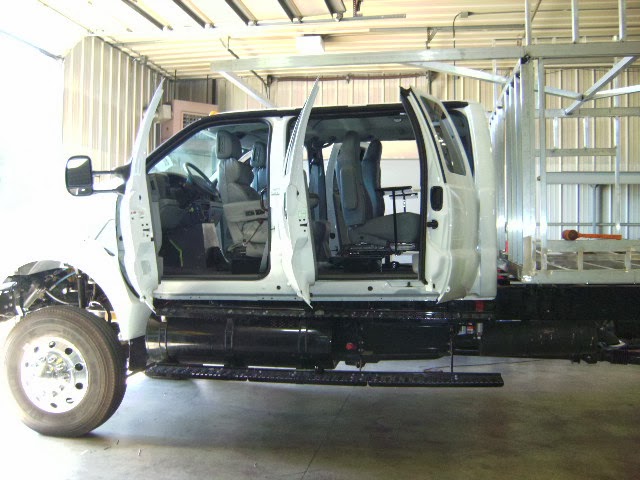Well, after 2 years of planning, sketching and shopping I’m very happy to announce that our expedition vehicle is finally under way! 
We are calling the project ECO-ROAMER and the intention is to build it in as environmentally friendly a manner as a diesel-belching-round-the-world-20,000-pound-truck can be…
I have taken great inspiration and learning from everyone here at ExPo, so I’m delighted that over the next several months we’ll finally be able to contribute back to the community and share our build-up as it progresses.
First a few details:
THE TRUCK:
This was the probably the hardest part. We had some fundamental requirements that limited the choices:
- 4×4 – obviously
- crew cab – 2 kids!
- diesel
- global service network
- big enough to handle a ‘big’ camper body
- available in the USA for the build
- comfortable for HOURS of highway driving
This eliminated several popular choices:
- Mitsu FG – Too Small
- Toyota Hino – Crew cab 4×4 only avail in Australia
- MAN – Not avail in USA
- Mog – Not ideal for highway cruising & crew cab limitations
- GM Topkick 5500 – Duramax Not globally serviceable
- Ford F550 – Engine not serviceable
Which basically left the International, and the Ford F-650.
International has a good dealer network, but we felt that CAT has an even broader parts/service network, and so we leaned towards the F-650 with the CAT C-7 engine and Allison 6-spd transmission. Both trucks can have the same Meritor axles, the same 2-piece wheels, the same MPT81 tyres, and similar load ratings.
Finally, we hit the ULSD diesel emissions challenge, so we decided to buy a pre-emissions control 2007 or earlier truck. Finding a ‘slightly used’ one that matched all our criteria proved to be very difficult until we found a crazy F-650 pickup with 3,000 miles and a distressed owner in need of selling.
We bought the truck, and will remove and sell the pick-up bed.
Since it’s a 2007 there should be no problem running it off ‘mostly’ Bio-Diesel, where available. (i.e. North America & Western Europe)
Here is what the truck looks like so far…

The bull bar was just built by Layne Wright at Denver Offroad Bumpers. He did an amazing job designing and hand crafting it all out of very light weight (and recycled) aluminum. It’s being powder coated black now. I’d STRONGLY recommend Layne to anyone!
The truck is on its way now to Tulsa Truck Manufacturing where Ron Turner and his guys are going to do the 4×4 conversion and stretch out / reinforce the frame.
THE CAMPER:
Over the past couple of years we looked at dozens of possible solutions for the camper. In the end we eliminated going with an off-the-shelf camper body like Doug Hackney’s (very nice) unit. Most were too small, and there were too many unique things we wanted.
That took us down to a short list of three custom manufacturers:
- Unicat – Extremely helpful, but also very expensive and rigid in their designs
- PonyXpress – Just sold, too unresponsive
- StarTracks – Very willing to work with our designs & based in the USA which keeps costs low compared to shipping the truck back and forth to Germany.
We’re still working on the details of the design and have had some great ideas & revisions so far. The current design looks like it will be 17ft long, plus 2 single beds for the kids above the cab.
The current plan looks something like this:

Here’s a 3D view of the interior that gives a better sense of how it fits together:

The dinette lowers to a double bed for guests, and there is a queen bed for us that lowers from ceiling above the dinette.
On one hand 17ft BEHIND a crew cab feels like it’s going to be a huge vehicle with a turning circle the size of a football field. On the other hand, 17ft is not a whole lot of space to plan out for full-time living space for two parents & two kids!
“ECO” COMPONENTS:
As I mentioned, we’re trying to build the vehicle in as ‘friendly’ a way as possible. There are a ton of elements we’ve built in to the design from that perspective, but some of the highlights include:
- Camper Shell – Made from Alucobond – 80% recycled aluminum composite
- Solar Panels – 1.8KW of solar power on the roof
- Cabinetry – All made from Bamboo, not “wood”
- Counters – Made from Richlite recycled paper board composites
- Flooring – Laminate mounted to recycled composite boards, not plywood
- Sewage – Diesel fired incinerator to avoid dumping our waste around the world
- Insulation – Very substantial to reduce heating/air-con power usage
- Lighting – MR16 converted lights to low-power LED arrays
- Fuel – No propane on board, everything can run off the bio-diesel (or regular diesel if necessary) and/or solar / generator.
Stay tuned for more pics and details over the coming months…
Related













Comments are closed here.